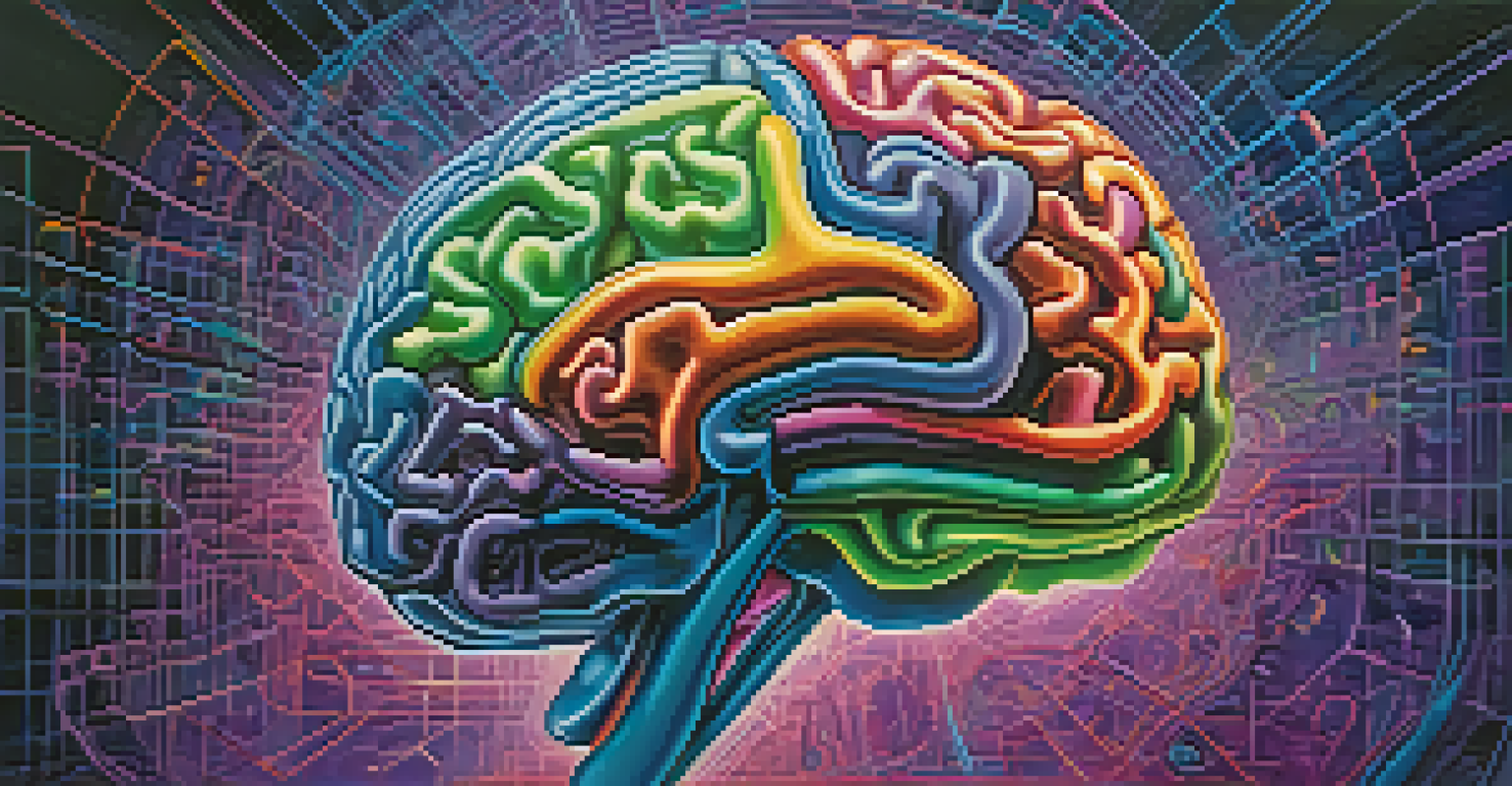The Role of DMN in Altered States Induced by Entheogens

What is the Default Mode Network (DMN)?
The Default Mode Network (DMN) is a network of brain regions active when we are at rest and not focused on the external environment. It plays a crucial role in self-referential thought, daydreaming, and recalling memories. When we engage in activities that require introspection or imagination, the DMN lights up, showcasing its importance in our cognitive functioning.
The greatest discovery of my generation is that a human being can alter his life by altering his attitude of mind.
Essentially, the DMN is like the brain's default setting, kicking in when we're not concentrating on a task. This network helps us connect past experiences with future possibilities, guiding our sense of self and our interactions with the world. Understanding the DMN is vital to exploring its effects when altered states of consciousness are induced.
Research has shown that substances known as entheogens can significantly alter the activity of the DMN, leading to profound changes in perception and self-awareness. This interplay between the DMN and entheogens opens up fascinating avenues for understanding consciousness.
Entheogens: A Brief Overview
Entheogens are substances that can induce altered states of consciousness, often used in spiritual or therapeutic contexts. Common examples include psilocybin (found in magic mushrooms), LSD, and ayahuasca, each with unique properties and effects. These substances have been used for centuries in various cultures for their ability to evoke deep introspection and connection to the universe.

The term 'entheogen' comes from Greek roots meaning 'generating the divine within,' highlighting their potential to facilitate experiences that feel transcendent or enlightening. Users often report shifts in perception, emotional release, and a sense of unity with their surroundings. Understanding how these substances interact with the brain, particularly the DMN, is essential for grasping their profound effects.
DMN: The Brain's Default Setting
The Default Mode Network (DMN) is active during rest and introspection, playing a key role in self-referential thought and memory recall.
As more research emerges, the therapeutic potential of entheogens is being recognized for treating conditions like PTSD and depression. This growing interest underscores the importance of exploring the mechanisms behind their impact on the DMN and other brain networks.
The Interaction Between DMN and Entheogens
When entheogens are consumed, they can lead to a temporary disruption of the DMN's typical functioning. Users often describe feelings of ego dissolution, where the boundaries of self seem to blur, and the usual sense of identity fades away. This phenomenon can allow for profound insights and shifts in perspective, as individuals may experience a sense of interconnectedness with the universe.
The mind is everything. What you think, you become.
Interestingly, this disruption can lead to heightened creativity and emotional release, as the brain's usual patterns of thought are altered. Many users report feeling more in tune with their emotions and better able to process past traumas during these experiences. This suggests that the DMN's role in self-referential thought can be both a barrier and a gateway to deeper understanding.
Research indicates that while DMN activity decreases during the peak of an entheogenic experience, it can also lead to the formation of new neural connections and insights once the effects wear off. This paradox highlights the complexity of the DMN's role in altered states of consciousness.
Ego Dissolution and Its Significance
Ego dissolution, often experienced during entheogenic journeys, refers to the sensation of losing one's sense of self. This phenomenon can be both liberating and frightening, as individuals may feel a disconnection from their personal identity. However, many report that this experience leads to profound healing and personal growth, allowing for a reevaluation of their lives and relationships.
From a psychological perspective, ego dissolution can help individuals confront aspects of themselves they may typically avoid. By temporarily stepping outside their usual self-concept, users can gain insights into their behaviors and thought patterns. This deeper understanding can foster significant changes in attitudes and beliefs long after the experience has ended.
Entheogens Alter Consciousness
Entheogens can induce profound changes in perception and self-awareness by disrupting the typical functioning of the DMN.
The DMN's role in facilitating ego dissolution is crucial, as it is the network that typically maintains our self-referential thoughts. By altering DMN activity, entheogens can help individuals transcend their limitations, leading to transformative experiences that can enhance well-being.
Therapeutic Applications of DMN Alterations
The alterations in DMN activity brought about by entheogens have significant implications for therapeutic practices. Researchers are exploring how these substances can be used in controlled settings to treat various mental health conditions. For instance, studies have shown that psilocybin can lead to lasting improvements in mood and anxiety for individuals with treatment-resistant depression.
By harnessing the ability of entheogens to disrupt habitual thinking patterns, therapists can guide patients through challenging emotions and experiences. This approach can help individuals confront and process traumas that may have been locked away in their subconscious. The temporary alteration of DMN activity allows for new perspectives and emotional breakthroughs.
As the stigma surrounding entheogens diminishes, more clinical studies are being conducted to understand their potential benefits. The insights gained from studying the DMN's role in these experiences could pave the way for innovative treatment protocols that harness the power of altered states for healing.
Future Research on DMN and Entheogens
The intersection of DMN activity and entheogen use is a burgeoning field of research. As scientists continue to explore the complexities of the brain, understanding how altered states affect the DMN could unlock new therapeutic avenues. Future studies may focus on specific entheogens and their unique impacts on brain networks, providing a more nuanced understanding of their effects.
Additionally, researchers are investigating how individual differences, such as personality traits and prior experiences, influence the outcomes of entheogenic experiences. This personalized approach could help tailor therapeutic interventions to better suit individual needs and enhance overall efficacy.
Ego Dissolution Promotes Healing
Ego dissolution experienced during entheogenic journeys can lead to significant personal insights and emotional breakthroughs, facilitated by changes in DMN activity.
With advancements in neuroimaging technology, scientists are now able to observe real-time changes in brain activity during these experiences. Such insights could not only deepen our understanding of the DMN's role but also contribute to the development of safer and more effective therapeutic protocols using entheogens.
Conclusion: Embracing the Complexity of Consciousness
The relationship between the Default Mode Network and entheogens highlights the complexity of human consciousness. As we delve deeper into how these substances influence the DMN, we gain valuable insights into the nature of self, perception, and healing. This understanding can enrich our appreciation for both the therapeutic potential of entheogens and the intricate workings of the brain.
By embracing the complexities of consciousness and the role of the DMN, we open ourselves up to new possibilities for personal growth and healing. The stories of those who have journeyed through altered states reveal the transformative power of entheogens, emphasizing the importance of responsible and guided use.

As research continues to evolve, it is essential to remain curious and open-minded about the potential benefits of entheogens. By fostering a better understanding of the DMN and its interactions with these substances, we can contribute to a more comprehensive view of mental health and well-being.